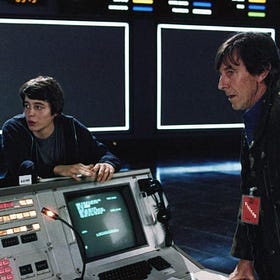Hi All,
OK—once again I lost control. I started writing what was supposed to be the completion of the AI piece—with some thoughts on how AI might work through the rest of the Ukraine War. However two things intervened. My discussion of AI and upcoming US developments became long enough as it was—so the end of the Ukraine War element will have to wait. I also had an itch I wanted to scratch by writing a short analysis of the the GOP primary result in New Hampshire (I actually don’t think it was great for Trump). That’s at the end—feel free to disregard.
At least you cant complain about a lack of content with this substack!
Really pleased that people enjoyed the last piece on how AI is already appearing on the battlefield of Ukraine. This next instalment of the series is going to be highly speculative (apologies) and discuss where AI might be going in defense terms. Ive been struck in particular by some US discussions, particularly surrounding the Replicator Initiative.

Btw, here is a link to the first segment.
AI is starting to Rule the Battlefield
Hi All, Note—I started writing this midweek update early this morning. I often start on Monday and it take a few days to finish and refine it. However, as I wrote it grew longer and longer, so I’m breaking it down into parts. Here is part 1. Part 2 will come out later in the week—unless another important event/story preempts it—in which case it will be next week. Apologies for the length!
I’m going to start this with an admission—that many people in western air forces, whom I work with and respect, hate. I see only a very limited role for crewed aircraft in the future of war. Its something that I’ve discussed a number of times with Air Force people (usually pilots). The military benefits on uncrewed aircraft seem to me so substantial that its inevitable that they will take over. Those benefits are:
Greater Flying Advantages. If you don’t have a human in a plane it can be smaller, less expensive, stay in the air much longer and operate more flexible. Basically providing all the very expensive and frankly large systems needed to keep a human alive onboard an aircraft is limiting. Take those out and the plane can fly for longer, can make maneuvers that would tax the human body, can have better shape, be smaller, etc.
Greater Decision-Making Advantages. Having humans in an aircraft in a war environment actually adds enormous pressure to the decision-making process. The human (or humans) are not only controlling the aircraft, they are targets themselves. As such, they need to keep their own lives protected, and that limits the time and place in which they can operate. Looking at the Russo-Ukraine War, the prospect of losing pilots on both sides is so high, that fixed-wing crewed aircraft are being pushed progressively further and further away from the battlefield. Without the pressure of keeping the crew alive, the decision making pressure to act too quickly would be lessened.
Greater Cost Advantages. I have some air force friends who swear that this is not yet true, but my guess is that it will be and sooner rather than later. This war has revealed that mass matters (during the War on Terror, the US advantage in technology was so great that perhaps this was hidden). If you can build aircraft without the need to house humans, that will end up being a multiple cost savings. You can save money on the construction of the weapons, and on different support systems (such as the need to send large numbers of pilots through advanced training). In a war between the US and China, for instance, equipment destruction would be massive, and pilot losses huge. The side that could produce the mass of advanced aircraft without the huge need for pilots would have a major advantage.
So, uncrewed aircraft have in my mind such massive advantages in terms of operational ability and cost that they will take over (eventually). The time line will really come down to one thing—systems of control. If a nation starts to rely on uncrewed aircraft overwhelmingly, it will need to have a robust and difficult to break system to control those aircraft (or for those aircraft to control themselves). You might see now where this is heading.
Keep reading with a 7-day free trial
Subscribe to Phillips’s Newsletter to keep reading this post and get 7 days of free access to the full post archives.



